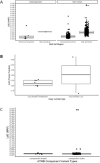Clinical and analytical validation of FoundationOne Liquid CDx, a novel 324-Gene cfDNA-based comprehensive genomic profiling assay for cancers of solid tumor origin
- PMID: 32976510
- PMCID: PMC7518588
- DOI: 10.1371/journal.pone.0237802
Clinical and analytical validation of FoundationOne Liquid CDx, a novel 324-Gene cfDNA-based comprehensive genomic profiling assay for cancers of solid tumor origin
Abstract
As availability of precision therapies expands, a well-validated circulating cell-free DNA (cfDNA)-based comprehensive genomic profiling assay has the potential to provide considerable value as a complement to tissue-based testing to ensure potentially life-extending therapies are administered to patients most likely to benefit. Additional data supporting the clinical validity of cfDNA-based testing is necessary to inform optimal use of these assays in the clinic. The FoundationOne®Liquid CDx assay is a pan-cancer cfDNA-based comprehensive genomic profiling assay that was recently approved by FDA. Validation studies included >7,500 tests and >30,000 unique variants across >300 genes and >30 cancer types. Clinical validity results across multiple tumor types are presented. Additionally, results demonstrated a 95% limit of detection of 0.40% variant allele fraction for select substitutions and insertions/deletions, 0.37% variant allele fraction for select rearrangements, 21.7% tumor fraction for copy number amplifications, and 30.4% TF for copy number losses. The limit of detection for microsatellite instability and blood tumor mutational burden were also determined. The false positive variant rate was 0.013% (approximately 1 in 8,000). Reproducibility of variant calling was 99.59%. In comparison with an orthogonal method, an overall positive percent agreement of 96.3% and negative percent agreement of >99.9% was observed. These study results demonstrate that FoundationOne Liquid CDx accurately and reproducibly detects the major types of genomic alterations in addition to complex biomarkers such as microsatellite instability, blood tumor mutational burden, and tumor fraction. Critically, clinical validity data is presented across multiple cancer types.
Conflict of interest statement
The authors have the following interests. At the time of this research RW, ML, JH, DD, JS, PM, WM, ND, CM, TC, AD, DS, MK, CB, CV, BA, PH, and LD were employed by Foundation Medicine, Inc., the funder of this study. This does not alter the authors' adherence to all the PLOS ONE policies on sharing data and materials, as detailed online in the guide for authors.
Figures


References
-
- Ribeiro TB, Ribeiro A, Rodrigues L de O, Harada G, Nobre MRC. U.S. Food and Drug Administration anticancer drug approval trends from 2016 to 2018 for lung, colorectal, breast, and prostate cancer. Int J Technol Assess Health Care. 2019;1–9. - PubMed
Publication types
MeSH terms
Substances
LinkOut - more resources
Full Text Sources
Other Literature Sources
Medical
Research Materials
Miscellaneous

